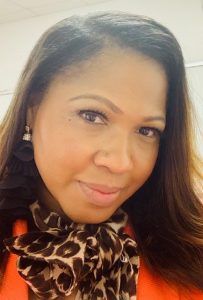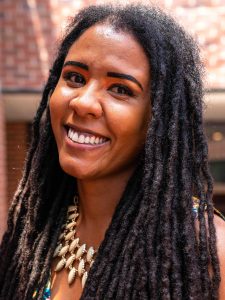The Inclusion, Diversity and Equity Committee is excited to celebrate Black History Month by recognizing some of our amazing Black faculty and staff members here at the College of Journalism and Communications. Each week of February, we will publish two interviews featuring a Black faculty or staff member. Find the some of the latest interviews below, or read the entire segment, here.

Director of Human Resources
Keisha Reynolds worked for Human Resources departments at several University of Florida colleges — Dentistry; Nursing; and Public Health and Health Professions — before joining the College of Journalism and Communications as HR director.
Can you share your personal thoughts about being a Black academic?
Black academics are absolutely necessary to gain a broader perspective within the African American community. But it is also vital for, not only Black Americans, but for all race and genders to understand the heritage and history — and understand where we come from and how we got here. Sometimes we will still see conversations surrounding the credibility of Black academics, although we are frequently overqualified and have endured robust experiences inside and outside of academia, because society still seeks to separate crayons instead of blending colors to see the bigger picture.
What is the most important lesson you’ve learned along this journey?
The most important lesson I have learned is humility and self-identity. The way you are and the way people view you, no one can change. I was raised on manners, and those are the things in a professional environment that no one can take away. Your self-identity is important, because no one else can be you and you can always be the best you. That’s your identity and your story. It is okay to be different and go against the grain because those are your values. Don’t always feel like you have to fit in. Lastly, everyone will not always fit in your circle as you move forward. The size of your social circle may fluctuate, but always pick these people wisely, because you may notice some people will drop off along the way.
What advice would you give to Black students interested in a career in communications or research?
I would say there are a lot of people who are not here today who wanted to be doctors, lawyers, teachers, journalists and communicators but they never took any action. So, I would say, “Why not now?” There is life and death in the power of the tongue. If you never act upon or never say anything, then no one will ever hear your story. That is the biggest tool, or weapon, that you have as a student.
What are your hopes for Black women and men in academia?
My hopes are that they remain inspired. Keep that torch going, continue to follow your dreams and don’t sweat the small stuff. Along your journey, you cannot sweat the small stuff because it will always come. If you’re grounded and you remain inspired, then you will understand that you have to just keep moving. Stay true to your mission and who you are. Don’t believe that you have to change who you are to get what you want because what is meant for you will come to you, regardless.

Imani Jackson is a Joseph L. Brechner Center for Freedom of Information legal fellow at the College of Journalism and Communications. She joined the center after earning her bachelor’s in Mass Communication from Grambling State University, and a Juris Doctor with an emphasis on Critical Race Theory degree from Florida A&M University. In 2019, She earned a master’s in environmental and land use law from the UF Levin College of Law and a graduate certificate in Latin American Studies.
Can you share your personal opinions about being a Black academic?
I have witnessed the influence of Black academics my entire life. My family members have been the first and strongest examples of Black academics. I have always seen how they influenced and encouraged others. Black academics are valuable, because they provide representation for Black students who do not usually see people who look like them in professional environments. Seeing people who look like them encourages students to feel freer to dream and normalizes the presence of Black faces in academia.
What advice would you give to students interested in a career in communications or research?
There are a few. First, keep an open mind. Next, read. Don’t just listen. Reading will help you enhance communication and grammar skills that will form a habit when you are writing. Lastly, be curious. It is okay to have niches or focuses that you invest in. It is also okay for these niches to change. You do not have to be a stereotype in your professional career. Whatever you are interested in, you should pursue. You never know who is interested in the same things you are.
Who has inspired your professional journey?
My family, and more specifically, my mother has inspired my professional journey. Being surrounded by Black educators gave me the understanding that nothing was out of reach. Whatever I wanted, I could get.

Bridget Dunbar is the academic adviser for the UF CJC Online Graduate programs. She is also an adjunct and teaches online courses. A double Gator — with a bachelor’s degree in public relations and a master’s in mass communication from the College of Journalism and Communications — she also has a graduate certificate in fundraising and has been working at the CJC for the past seven years.
Who has inspired your professional journey?
My mother for sure! While she is not in academia, everything I have done and accomplished has been with her and her immense sacrifices in mind. She migrated here from her home country of Jamaica at 20 years old simply to create a new, better life for her children. I have seen her work her entire life through some of the toughest times — and no matter what, she has never given up. I have very much inherited my determined attitude from her. Even though she didn’t have the same educational opportunities I have had, she has always valued education and worked hard to ensure that her kids would be able to go to college and be whatever we desired to be.
My co-worker, Meisha Wade, has also been very inspiring to me. She may not know it, but I have watched her flourish in her role as an academic adviser over several years and have been so inspired by her integrity, grit and the way she genuinely cares about every student she comes in contact with. She is such a light to our office! She unknowingly has mentored me in so many ways, and I am thankful that I have the opportunity to work with such an amazing person and fellow black woman in academia.
What are your hopes for Black women and men in academia?
My hopes for Black women and men in academia are that we will continue to rise above and blaze the trail for those coming after us. We have collectively and individually fought many battles to get to where we are today, but this is really just the tip of the iceberg. My hope is that we continue to not only see the value in ourselves and what we do every day, but that we see the value in all of those who look up to us and that we never stop reaching back to pull someone forward with us.
Can you share your personal thoughts about being a Black academic?
Being Black in academia, especially from the perspective of an academic adviser, has been both a challenging and very rewarding experience. Black men and women add a perspective and voice to academia that is so needed. I also think it is imperative for Black students, whether they are interested in academia or not, to see themselves represented/reflected in the faculty/staff they encounter on a daily basis. Students seeing themselves represented in academia contributes to a sense of belonging that can sometimes get lost in institutions as big as UF. I can’t tell you how many of my Black (or even just minority) students have opened up to me about their experiences and struggles, simply because they know I could relate or at least listen from a perspective of understanding rather than judgment. Representation in academia matters — period.
What advice would you give to Black students interested in communication careers or research?
The first piece of advice I would give is to seek out mentors in the area you are interested in, and utilize every resource that is available to you. Our college has some amazing people who truly want to help and resources that students often overlook or underutilize. Always ask questions and make connections. The second is to become the BEST at being you and doing whatever it is you were created to do. Be trailblazers, don’t back down — and when someone tells you that you can’t accomplish it, show them all the reasons why you can! You will face challenges, things will get hard, but you’ve got what it takes to succeed. You just have to want it enough for yourself and be willing to do the work.

Daressa Howard earned her bachelor’s degree in Sociology at UF. She then went on to pursue a Master’s Degree in Educational Leadership and Administration from the University of Central Florida. She returned to UF working in the Office of Admission before joining CJC.
Can you share your personal thoughts about the value of Black academics?
I think Black academics are very important for a number of reasons, one of which being representation. It is essential to have our perspectives, thoughts and experiences included in academia. It is also important that our Black students see us in the academic environment. Sometimes students can feel alone and it can be comforting to see people that look like them in professional environments.
What is the most important lesson you have learned along this journey?
The most important lesson I’ve learned is to be true to myself, who I am and what I may believe in. You are your walking brand. In my role at CJC, it is all about making connections, so me being myself in every situation helps me build relationhips that I use in my work. I always want to be in different rooms with different people because I feel I have something to offer.
Who has inspired your professional journey?
My parents, even though they never attended college, always taught me that I could do or be anything I wanted. They always had a lot of pride in me and kept me motivated. My dad used to work at UF, and to see the advancements I have made in my three years compared to his 30 years is truly inspiring.
Michelle Obama really taught me how to own my story and throw the rope back down to lift people up with me.
There are also some amazing people in the CJC who have helped me get acquainted with the environment.
What advice would you give to students interested in communications careers and research?
Pinpoint your “why.” Find what drives you because when school gets hard, or life in general gets hard, you will need to go back to your “why” to keep you going.
